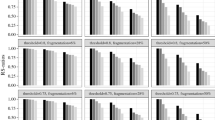Abstract
Qualitative comparative analysis (QCA) is a technique originally developed by Charles Ragin in the field of political science. It accepts data sets from the problem of interest, and applies the rules of logical inference to determine the relations between combinations of variables and outcomes, which helps researchers validate hypotheses or discover new implications. However, existing QCA approaches or tools have limited capacities in handling multivalued explanatory and outcome variables, as well as in outputting compact results for human analysis. In this paper, we propose a novel QCA approach, which can deal with multivalued variables and support more complicated analysis. Our approach enables 1) multi-value reduction of candidate rules; and 2) effective counterfactual analysis associated with expert knowledge. We also implemented a new tool called fully functional multi-value QCA (fm-QCA). Through the evaluation, our tool outperforms existing state-of-the-art QCA tools in producing more compact analysis results as well as discovering more inferences.
Preview
Unable to display preview. Download preview PDF.
Similar content being viewed by others
References
Amenta, E., Caren, N., Olasky, S.J.: Age for leisure? political mediation and the impact of the pension movement on us old-age policy. American Sociological Review 70(3), 516–538 (2005)
Basurto, X.: Linking multi-level governance to local common-pool resource theory using fuzzy-set qualitative comparative analysis: insights from twenty years of biodiversity conservation in costa rica. Global Environmental Change 23(3), 573–587 (2013)
Cartwright, N.: Hunting causes and using them: approaches in philosophy and economics. Cambridge University Press (2007)
Cronqvist, L.: Tosmana, version 1.3. 2.0 [computer program], p. 88. University of Trier, Trier (2011)
Dixon, M., Roscigno, V.J., Hodson, R.: Unions, solidarity, and striking. Social Forces 83(1), 3–33 (2004)
Gao, M., Jiang, J.H., Jiang, Y., Li, Y., Sinha, S., Brayton, R.: Mvsis. In: Proc. of the Intl. Workshop on Logic Synthesis (2001)
Greckhamer, T., Misangyi, V.F., Elms, H., Lacey, R.: Using qualitative comparative analysis in strategic management research: An examination of combinations of industry, corporate, and business-unit effects. Organizational Research Methods (2007)
Hagan, J., Hansford-Bowles, S.: From resistance to activis m: The emergence and persistence of activism among american vietnam war resisters in canada. Social Movement Studies 4(3), 231–259 (2005)
Hellström, E., Seura, S.M.: Conflict cultures: qualitative comparative analysis of environmental conflicts in forestry, vol. 2. Finnish Society of Forest Science [and] Finnish Forest Research Institute (2001)
Karnaugh, M.: The map method for synthesis of combinational logic circuits. Trans. AIEE. Pt. I 72(9), 593–599 (1953)
Kask, J., Linton, G.: Business mating: when start-ups get it right. Journal of Small Business & Entrepreneurship 26(5), 511–536 (2013)
Korjani, M.M., Mendel, J.M.: Fuzzy set qualitative comparative analysis (fsqca): Challenges and applications. In: 2012 Annual Meeting of the North American Fuzzy Information Processing Society (NAFIPS), pp. 1–6. IEEE (2012)
McCluskey, E.J.: Minimization of boolean functions*. Bell System Technical Journal 35(6), 1417–1444 (1956)
Mendel, J.M., Korjani, M.: Fast fuzzy set qualitative comparative analysis (fast fsqca). Submitted for Presentation at NAFIPS (2012)
Mendel, J.M., Korjani, M.M.: Charles ragin’s fuzzy set qualitative comparative analysis (fsqca) used for linguistic summarizations. Information Sciences 202, 1–23 (2012)
Mendel, J.M., Korjani, M.M.: Theoretical aspects of fuzzy set qualitative comparative analysis (fsqca). Information Sciences 237, 137–161 (2013)
Osa, M., Corduneanu-Huci, C.: Running uphill: political opportunity in non-democracies. Comparative Sociology 2, 605–630 (2003)
Ragin, C.C.: The Comparative Method: Moving Beyond Qualitative and Quantitative Strategies. Univ. of California Press (1989)
Ragin, C.C.: Fuzzy-set social science. University of Chicago Press (2000)
Ragin, C.C.: Redesigning social inquiry: Fuzzy sets and beyond. Wiley Online Library (2008)
Tang, R., Tang, S.: The historical heritage and the former soviet union and east european countries democratic transition. World Economics and Politics 2, 39–57 (2013)
Thiem, A., Dusa, A.: Qca: A package for qualitative comparative analysis. The R Journal 5(1), 87–97 (2013)
Wickham-Crowley, T.P.: A qualitative comparative approach to latin american revolutions. International Journal of Comparative Sociology 32(1), 82–109 (1991)
Author information
Authors and Affiliations
Corresponding author
Editor information
Editors and Affiliations
Rights and permissions
Copyright information
© 2015 Springer International Publishing Switzerland
About this paper
Cite this paper
Wu, K., Tang, S., Pu, G., Wu, M., Su, T. (2015). Fm-QCA: A Novel Approach to Multi-value Qualitative Comparative Analysis. In: Zhang, S., Wirsing, M., Zhang, Z. (eds) Knowledge Science, Engineering and Management. KSEM 2015. Lecture Notes in Computer Science(), vol 9403. Springer, Cham. https://doi.org/10.1007/978-3-319-25159-2_10
Download citation
DOI: https://doi.org/10.1007/978-3-319-25159-2_10
Published:
Publisher Name: Springer, Cham
Print ISBN: 978-3-319-25158-5
Online ISBN: 978-3-319-25159-2
eBook Packages: Computer ScienceComputer Science (R0)





